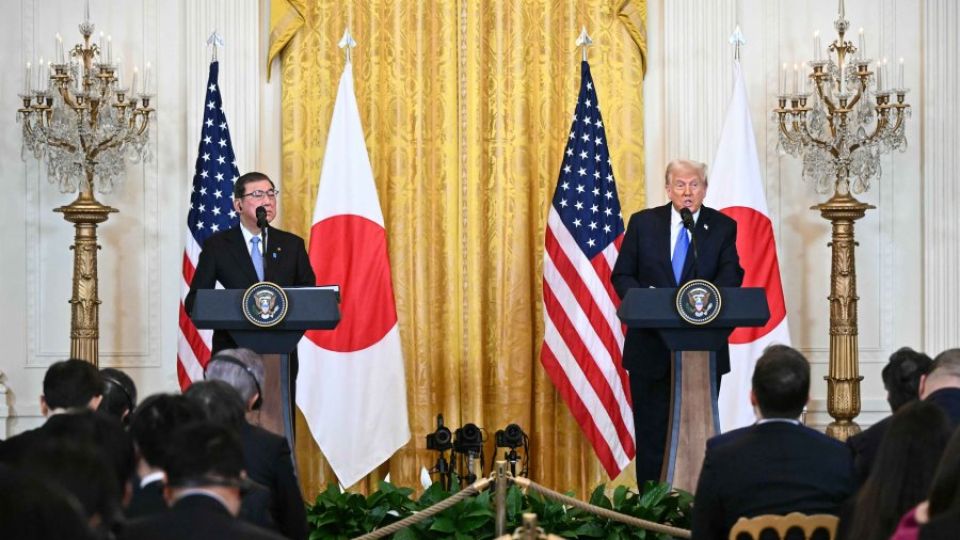February 13, 2025
TOKYO – This is the third and final installment in a series of articles exploring the background of the recent Japan-U.S. summit meeting and the future of the two countries’ relations.
At a working lunch between the Japanese and U.S. leaders at the White House on Friday, Prime Minister Shigeru Ishiba asked President Donald Trump, who was eating sole meuniere: “Shall we work together on the development of defense equipment?”
The prime minister was referring to the joint development of unmanned aerial vehicles. Ishiba also was said to have reiterated Japan’s plan to purchase the latest F-35 stealth fighter jets, the delivery of which has been delayed by the United States.
Trump stopped eating and leaned forward and listened intently to Ishiba’s explanations.
Japan’s purchase or joint development of defense equipment would help the United States eliminate its trade deficit with Japan.
The Japanese side made careful preparations for the meeting and steered the direction of discussions toward the practical benefits for the United States in areas that are of great interest to Trump, such as investment and the reduction of the trade deficit, as well as security.
The strategy worked. Trump said at the start of the joint press conference after the meeting, “I’m confident that the cherished alliances between our two countries and others also will continue to flourish long and into the future.”
The joint statement issued by the two leaders also stipulated the advancement of “multilayered and aligned cooperation” among like-minded countries, including the Quad framework comprising Japan, the United States, Australia and India.
The talks successfully kept Trump’s attention focused on the Indo-Pacific region, despite him being seen as reluctant to engage in multilateral cooperation.
“That we were able to show the world that Japan and the United States are functioning as a stabilizing force is significant,” a senior Foreign Ministry official said.
However, it is still too early to say that Trump’s views on diplomacy and security have changed. The remarks made at the beginning of the press conference were prepared text, which Trump merely read out.
The joint statement was also the result of extensive discussions between National Security Adviser Masataka Okano and his U.S. counterpart Mike Waltz and was finalized just before the meeting.
“President Trump likely left the joint statement to his subordinates and probably didn’t look at the content much,” a senior Japanese government official said.
Japan and the United States are in accord in terms of dealing with China, and the Trump administration is also promoting multilateral cooperation in the Indo-Pacific region based on “the idea of how to counter China,” a senior foreign ministry official said. The question is whether this interest can be extended to other regions.
No in-depth discussion regarding the Russian aggression in Ukraine or the situation in the Middle East, including the Palestinian territory of Gaza, took place at the latest Ishiba-Trump meeting. The joint statement also omitted “the rule of law,” a common democratic value.
To handle Trump’s highly unpredictable nature, Japan “avoided getting involved in other regions and focused on the Indo-Pacific region first and foremost,” the ministry official said.
The Group of Seven countries, which include Japan and the United States, are facing discord over Ukraine and the issues in the Middle East. As China and Russia strengthen their ties, Japan must act to avoid a rift among G7 countries and find a way to prevent the Global South from distancing themselves from the United States. Japan’s diplomatic and security policies, which are based on the Japan-U.S. alliance, will be put to the test.

